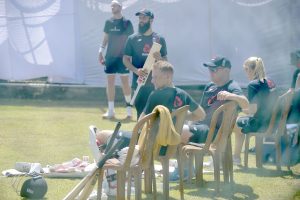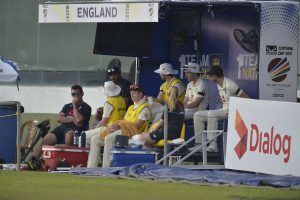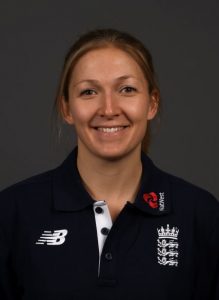Emma Gardner: Supporting athletes during Ramadan
Senior Performance Nutritionist Emma Gardner has been working at the English Institute of Sport (EIS) since 2012, when she joined as an intern at the start of her career. Working with GB Hockey, Northampton Saints and the England and Wales Cricket Board (ECB), Emma’s roles have seen her travel the world providing nutrition advice and support to a wide range of high performance athletes.
One of the things that Emma has gained experience and insight into is supporting athletes through the Holy month of Ramadan, working closely with the likes of World Cup winner and IPL superstar Moeen Ali.

Reflecting on the past decade, Emma explained how she quickly realised the importance of conversation and listening to the needs of each individual athlete:
“The first thing is to have the conversation with the athletes to ask if they want your support and advice. You might have your idealism of what nutrition should look like, based on the science, but you have to have to understand what the holy month of Ramadan means to them and respect what that entails for them as an individual.
“The first time I sat down with Moeen [Ali], he said he very much did want and appreciated support, so from there we discussed what he felt had worked for him given his previous experiences, and put strategies in around that.
“Typically, a month out from Ramadan, myself, the athlete and the Strength & Conditioning Coach will sit down and look at what the situation is, so this year Moeen is in the IPL, playing matches, so there’s only so much we can influence in terms of his schedule. The other two players I support are back in the UK, so we can advise them on the type of training they might do at certain times of the day and how we can optimise their nutrition around that.
We may advise them to train first thing in the morning, after they’ve broken fast, or delay and train at the back end of the day when they’ve broken fast and are fuelled for the session and can recover afterwards.
“In previous years we have found that athletes can sometimes lose lean mass during Ramadan, so overall calorie, as well as carbohydrate and protein intake become really important, so we plan strategically through from Iftar to Suhoor. We will put in how much carbohydrate we want them to have, how they hit their protein requirement and then hydration is the third big area, we have to make sure try to keep them hydrated, particularly if it will be warm weather.
“In terms of what the meal actually is, I let them guide me, because they will have certain meals and certain foods that they would normally eat as part of the celebration of Ramadan, then I will give them some recommendations of what I suggest they try and incorporate in those meals too.”

Working in a science-based role, Emma is used to dealing with data and scientific research, however, working with athletes during Ramadan has taught her a new perspective.
“Sometimes we go in assuming there will be a negative impact [on performance during Ramadan], so for me there has been a big mindset shift. Moeen feels he plays some of his best cricket during this period, so it’s not always detrimental, it can be a positive thing and it’s important to capture that. Moeen feels that the spiritual side and having a better focus and having to be diligent with his preparation, makes him a better player.
“Often we go too far down the objective route and my biggest advice to colleagues is get a good relationship with the player or athlete and understand how it works for them. The players I work with, it’s the hydration rather than their energy that they find hardest. So data is important, but there will always be anomalies and you need to find out what the athlete experiences and feels.
“Sometimes it’s the simple logistics, a lot of hotels for example, may stop their room service overnight, so during the World Cup, we had to arrange specific meals at set times, by working closely with the players on their requirements alongside the chefs. So being able to set them up a breakfast at 3 o’clock in the morning, was a big thing for those athletes.”

The EIS Nutrition Team of more than 20 nutritionists works in partnership with over 40 sports and Emma was keen to highlight how through this network, she has been able to share her learnings to improve knowledge across the system.
“Millions of people celebrate Ramadan every year, yet we still don’t fully understand enough about it from an athletic point of view, but research is being conducted which is great. I do think that’s changing, especially with high profile events like London 2012 and the Cricket World Cup having been held during Ramadan.
“When it came to my Professional Registration of Nutrition many years ago, I decided to submit my case study on Ramadan, because I thought it would be useful to document that and highlight the lack of understanding in this area. In our EIS Nutrition team, we share our learnings and because of that, our knowledge increases.
“Ultimately, we want to support every single athlete as well as we can.”
Emma Gardner is currently Performance Nutritionist for GB Hockey Women and the England and Wales Cricket Board (ECB)
Find out more about the EIS Nutrition Team